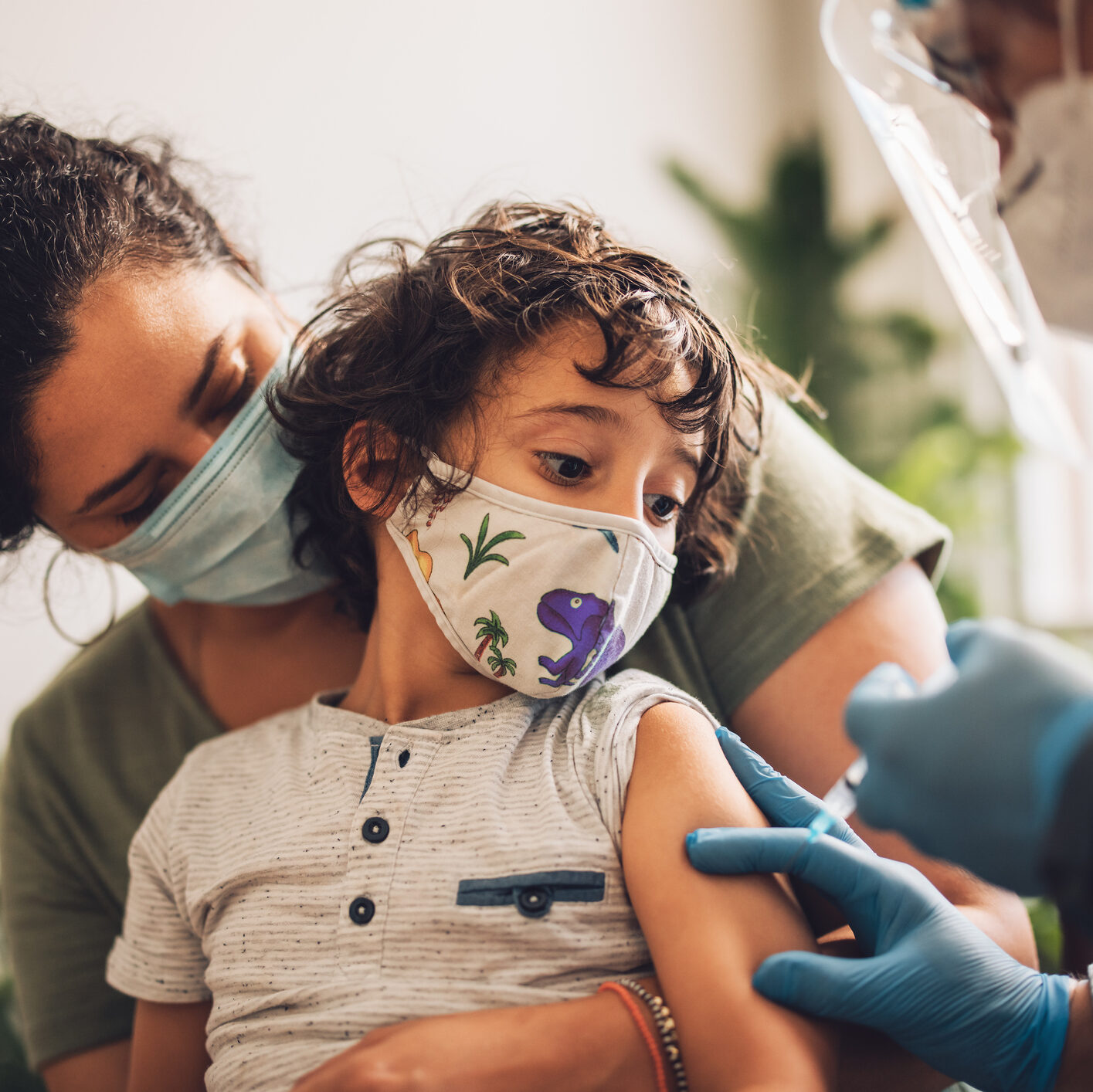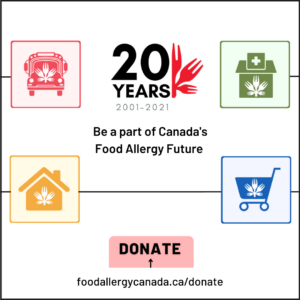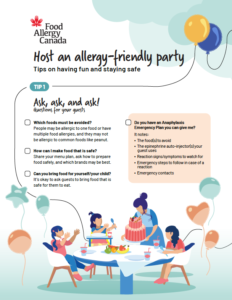We are grateful for you and for everyone who supported us for GivingTuesday. Learn about our new holiday campaign and how you can give to support our different initiatives focused on having a better #FoodAllergyFuture, plus find out how to navigate food allergy during the holidays and while continuing to manage COVID-19. Get details on the Omicron COVID-19 variant, and answers to questions that came up during our COVID-19 vaccines and kids with food allergy: what parents need to know webinar (the recording is now available for you to watch). ICYMI, you can now watch our webinar on cow’s milk protein allergy in babies. Plus, join us in thanking our funders for their generous support of our initiatives this year.
GivingTuesday gratitude! Thank you for your support.

Thank you for supporting us this past week on GivingTuesday – whether you donated, helped to spread the word, or simply took the time to read our emails to learn how your generous contributions make an impact. We are very grateful for your support and commitment to help create a brighter #FoodAllergyFuture.
This year, we received almost $5,000 in donations and we are hoping to reach $50,000 by the end of the year so we can continue making transformative change. Help us get there by donating today.
Throughout the month, we will be highlighting different ways you can support us and help make life better for all Canadians impacted by food allergy. Check out our holiday campaign to learn more!
It’s our 20-year anniversary! Help us celebrate and become a part of Canada’s #FoodAllergyFuture
2021 marks our 20th anniversary and we are excited to celebrate this milestone by reflecting on our incredible achievements throughout the last two decades. You and other members of our food allergy community have been instrumental in helping us advocate to make big impacts like making food labels clearer, creating policies in schools to make safer spaces for all our kids, and ensuring we now have 3 auto-injector suppliers in Canada.
Now we need your help to continue making transformational change. Donate now to help ignite these initiatives:
- Access to evidence-based information and support at diagnosis and during critical life transitions – no one should be left behind
- Access to accurate ingredient information – everyone has a right to know what’s in their food
- Access to epinephrine and knowing when and how to treat anaphylaxis - taking the fear out of anaphylaxis and empowering Canadians
- Educating the next generation – to help build informed and supportive communities
Be a part of Canada’s food allergy future and donate now. Donate $20 or more and get your year-end tax receipt right away!
Holiday tips and celebrating safely
The holidays are upon us, and they may continue to look different this year due to the ongoing pandemic. No matter how you’re spending the holidays, we’re here to support you and your loved ones with food allergy.
In our food allergy and the holidays section, you’ll find a variety of tips and resources to help you navigate this year’s festivities with confidence, including:
- Tips for celebrating safely with food allergy during COVID-19
- Tips for preventing reactions and staying safe
- Our handy hosting tip sheet to be given to your hosts so they can help to ensure their guests with food allergy will be safe and comfortable
- Various holiday resources like allergy-friendly recipes, videos on celebrating safely and avoiding cross-contamination, and more!
Plus, in the season of giving, find:
- How you can help make an impact this holiday season
- Different event ideas for fundraising such as an online fundraiser!
Your questions answered: Omicron COVID-19 variant, COVID-19 vaccines for 5-11-year-olds, and more
With the recent approval of COVID-19 vaccines for kids aged 5-11 in Canada, you may have questions about what it means for those with food allergy. Watch the recording of our webinar held last week to hear from our panel of experts and learn more on this topic.
After our webinar, there were a few questions that remained that we wanted to ensure were addressed. We found answers to these questions from ScienceUpFirst, a national initiative that works with a collective of independent scientists, researchers, health care experts and science communicators. Vaccines for kids: watch our webinar
Vaccines for kids: watch our webinar Hear from our panel of experts as they answer your top questions including vaccine options, how safety and efficacy are determined, impacts of the vaccine to kids with food allergy, side effects in kids, and if children do not frequently experience severe illness with COVID-19, why do they need to get the vaccine? Plus, hear about the benefits and risks of the vaccine.
 Omicron: new COVID-19 variant of concern
Omicron: new COVID-19 variant of concernFind more information from ScienceUpFirst on the COVID-19 variant Omicron.
While efforts are underway to understand more about this variant, the recommended ways to protect yourself include getting vaccinated if you haven’t already, getting your booster shot when eligible, and following measures such as handwashing, mask wearing, and physical distancing.
Sabina Vohra-Miller, MSc Pharmacology and Founder of Unambiguous Science covers this question. She explains that vaccine doses are not based on weight, and kids should get protected as soon as possible.
The National Advisory Committee on Immunization (NACI) also advises that children who receive the paediatric vaccine for their first dose and who have turned 12 by the time the second dose is due may receive the vaccine that is authorized for individuals aged 12 years and older to complete their primary series. However, if the second dose given is the paediatric dose, it is still considered valid and the series complete.
Health Canada authorizes vaccines based on clinical trial data. Pfizer tested the vaccines with 3 week intervals, so that’s what Health Canada approved.
NACI recommends how best to use the authorized vaccine.
An interval of at least 8 weeks may contribute added efficacy and safety on an already very safe, effective and high-quality vaccine.
ICYMI: Cow’s milk protein allergy (CMPA) webinar – recording now available
Webinar: Cow’s milk protein allergy in babies: what is it and how to manage it
Find out what CMPA is and how it can be managed through our informative and educational webinar on this medical condition. You’ll gain a better understanding of it along with practical management strategies that families can follow from two expert guest speakers – an allergist and a registered dietitian.
A bilingual version of this webinar will be available soon.
Plus, check out our past webinar recordings for information on various food allergy-related topics.
#FoodAllergyChampions: Thank you to our funders for their generous support!

With the generous contributions of our funders, we can advocate on key issues that are important to the food allergy community, improve quality of life, develop priority educational initiatives, and create awareness activities to help decrease the public’s knowledge gaps around food allergy.
Join us in thanking these individuals and organizations for helping to #MakeFoodAllergyCount.
TRANSFORMATIVE SUPPORTERS
Walter and Maria Schroeder Foundation
Family and friends of Sean Delaney
FOUNDATION SUPPORTERS
TD Securities Underwriting Hope Foundation
Williams Wilson Sherport Foundation
INDIVIDUAL SUPPORTERS
Thank you to the 298 individuals and families who supported Food Allergy Canada so far this year
CORPORATE SUPPORTERS
Bausch Health, Canada Inc. / Emerade™
kaléo / ALLERJECT®
Pfizer Canada / EpiPen®




